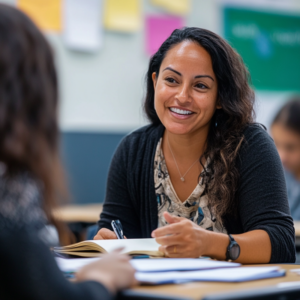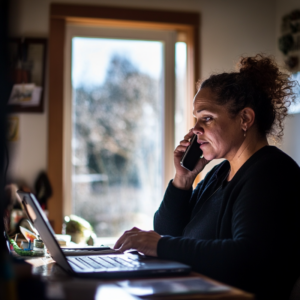When it comes to productive parent-teacher meetings, preparation is everything. We’ve all been there: sitting in a room, waiting for the discussion to start, and hoping we remember everything we wanted to talk about. It can be a bit stressful, right? But with the right approach, we can transform that anxiety into a productive dialogue. After all, “Preparation is key to making the most of your time.” - Educator's Insight. Here’s how we can ensure our meetings are effective and beneficial for our children's academic journey.

1. Crafting Thoughtful Questions About Academics
As a parent, it’s vital to engage with the teacher about how your child is performing in class. But what should we ask? Let’s think about this: Instead of sticking to basic questions, consider crafting questions that reflect your child's unique challenges and strengths. Here are some examples:
By preparing these thoughtful questions, we show that we care. This lays the groundwork for a meaningful conversation about our child's academic progress.

2. Discussing Behavioral Concerns Without Sounding Accusatory
Let's face it: discussing behavioral issues can be tricky. We don’t want to come off as confrontational. Instead, our goal is to collaborate with the teacher. When it comes to discussing behavioral concerns, we can use “I” statements. For example:
This way, we’re inviting the teacher to share their observations, rather than pointing fingers. It opens up a dialogue rather than creating a defensive atmosphere.
3. Setting Personal Goals for Feedback on IEPs
If your child has an Individualized Education Program (IEP), it’s essential to have clear goals in mind for these meetings. Are there specific aspects of the IEP we want to discuss? Here are some goals we might consider:
By going into the meeting with defined goals, we can make sure that our time is spent talking about what truly matters.
4. Bringing Materials That Highlight Your Child's Work
How can we make our points more impactful? Bringing along examples of our child’s work can be powerful. If they’ve written a fantastic story or completed an impressive project, ask the teacher for feedback on it. You might consider:
This not only showcases our child’s achievements but also prompts the teacher to provide specific feedback, which can lead to a richer discussion.

Now that we’ve set our points and prepared questions, let's talk about taking notes. While discussing sensitive topics, we can be nervous. To alleviate this, here are some tips:
When discussing concerns about our child’s peers, it’s essential to approach with caution. We might say:
By framing our concerns in a constructive manner, we can facilitate a collaborative environment that benefits everyone involved.
| Key Preparation Aspects | Examples |
|---|---|
| Crafting Questions | What specific areas does my child excel in? |
| Behavioral Concerns | I've noticed my child seems anxious about participating. |
| IEP Goals | Understanding how accommodations are being implemented. |
| Child's Work | Samples of assignments they enjoyed. |
Preparing for a meeting can feel overwhelming, but by taking these steps, we can create a supportive environment. Let’s remember, we’re all on the same team with the same goal: to help our children thrive. With thoughtful preparation, we can ease the tension and turn these moments into opportunities for growth and connection.

After attending a productive parent-teacher meeting, meeting with a teacher can feel like crossing a finish line. You've asked your questions, voiced your concerns, and gathered insights into your child's learning. But wait! The journey doesn't end here. The art of follow-up communication is essential. It's like watering a plant to help it grow. Without follow-up, progress may wither. Let's dive deeper into how we can strengthen this vital connection.
1. Writing Concise Follow-Up Emails
After a productive conference, it's time to craft a follow-up email. But how should this email look? Keeping it concise is key. Below are some tips for writing effective follow-up emails:
Here's a quick example:
Dear Mr. Smith,
Thank you for taking the time to meet with me regarding Emily's progress. I appreciate your insights on her reading skills. Could you clarify the reading materials you mentioned? I want to ensure we’re on the same page for her upcoming assignments. Looking forward to your guidance.
Best, Jane Doe
2. Establishing Ongoing Communication
Communication shouldn’t be a one-time event. Establish ongoing contact with your child's teacher. This continuous flow of information is crucial. It lays the foundation of a supportive team, essential for your child's academic journey.
Why is ongoing communication important? Well, it ensures everyone is aligned on your child's goals and progress. Consider setting a schedule for follow-ups. Maybe a weekly or bi-weekly check-in? This avoids misunderstandings and provides opportunities for enrichment.
3. Framing Email Questions Appropriately
When framing your email questions, simplicity is essential. Avoid lengthy or complex questions that might confuse the recipient. Here are some tips to help you phrase your inquiries:
4. Creating a Timeline for Follow-Ups Post-Conference
Timeliness is important in communication. Creating a clear timeline for your follow-ups after productive parent-teacher meetings helps keep everyone accountable. Aim to send your follow-up email within 48 hours of the meeting. This shows your commitment to your child's education. Here’s a simple timeline you can use:
Effective follow-up communication is about more than just sending emails. It's about building a partnership. Remember: “Continued communication is the bedrock of mutual understanding.” - Anonymous. When both parents and teachers work together, children thrive. So, keep that communication flowing!

We all have days when things don’t go as planned. Maybe you had an emergency to tend to, or something unexpected came up. Missing a productive parent-teacher meeting can feel stressful. But don't worry! When we can't be there in person, there are plenty of alternatives to ensure our children still receive the support they need. After all, “Life happens, but your child’s education doesn’t have to suffer.” - Parent Advocate.
1. Explore Email Communication
Email is a fantastic way to reach out to your child’s teacher if you miss the conference. A well-crafted email can convey your concerns and questions effectively.
Creating a dialogue through email allows us to stay engaged with our child’s education. It is also helpful to follow up later, reinforcing the connection we seek with the teacher.
2. Setting Up Telephone Discussions
A phone call can provide the personal touch that emails sometimes lack. If we can't meet in person, this is a viable alternative. Here’s how to have a successful call:
Use the call to create rapport and discuss how to best support your child at home. It's all about collaboration!
3. Accessing Missed Conference Information
Sometimes, it’s about knowing where to find the information. Teachers often have materials they can share.
Being proactive is essential. Don't hesitate to reach out. Knowledge is power, and the more we know, the better we can support our children.
4. Building a Personal Connection
Even if we miss the conference, it’s possible to establish that personal connection with the teacher.
Building this connection can lead to better collaboration and a stronger support system for your child.
Many parents have navigated the tricky waters of missed conferences. Some have found that the communication they established afterwards allowed for a deeper understanding of their children’s needs.
For instance, one parent shared: “I missed the semester's conference due to work. I connected with the teacher via email. It turned out they were more than happy to chat! I felt reassured after our conversation.”
That’s real proof that we should not feel defeated. Instead, we can adapt and find ways to stay informed.
Lastly, remember that your child also needs to feel supported despite missed meetings. Here are a few ways to ensure that:
Even when we miss out, it’s key to stay involved in our children's education. Together, we can create a supportive learning environment. For more information about preparing for Parent Teacher conferences check out Effective Strategies for Successful Parent-Teacher Conferences.
Fantastic site Lots of helpful information here I am sending it to some friends ans additionally sharing in delicious And of course thanks for your effort
"Well explained, made the topic much easier to understand!"
Back Magazin For the reason that the admin of this site is working, no uncertainty very quickly it will be renowned, due to its quality contents.